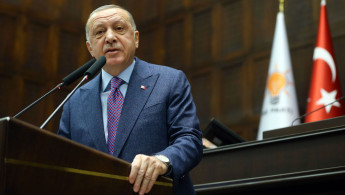Erdogan demands solidarity, support from NATO in Syria conflict
Turkey's President Recep Tayyip Erdogan demanded more support Monday from his NATO and EU allies, despite anger over his bid to pressure them by triggering a new migrant crisis.
Erdogan wants Turkey's western partners to do more to help support his country in the conflict in Syria and to cope with millions of refugees from the fighting.
But on a visit to EU and NATO leaders in Brussels, he also heard criticism of his decision to allow a new wave of migrants and refugees to try to cross into Greece.
"NATO is in a critical process in which it needs to clearly show its alliance solidarity," Erdogan said alongside the alliance's chief Jens Stoltenberg.
"Our allies should display their solidarity with our country without discrimination and without laying down political conditions," he said. "It is very important that the support we demand is met without any further delay."
Erdogan was due to hold talks with EU leaders Charles Michel and Ursula von der Leyen, who have backed Greece as Europe's "shield" against migrants encouraged to leave Turkey.
They have urged the Turkish leader to halt refugee and migrant departures and negotiate a new deal under which EU members would do more to alleviate the humanitarian situation on the Syrian border.
But Erdogan had harsh words for Prime Minister Kyriakos Mitsotakis' Greek government, which has already been given 700 million euros by Brussels to secure his borders and cope with the new arrivals.
"It is irrational and inconsiderate that an ally and a neighbouring country point to Turkey as responsible for the irregular migration," Erdogan said.
"We will not allow this country to try to get unfair gains by using its current position."
Stoltenberg highlighted Turkey's front line role as a NATO member, saying: "No other ally has suffered more from terrorist attacks, and no other ally holds more refugees."
He said NATO support would continue but expressed "great concern" about events on the Turkish-Greek border and said: "The issue of migration and refugee flows is a common challenge that requires common solutions."
'Frank' dialogue
Ahead of his talks with Erdogan, European Council president Michel urged him to respect a previous agreement in which Turkey was to halt a refugee exodus in return for six billion euros.
But he admitted: "We have different opinions on different things, that's why it's important to have a frank and open dialogue."
European leaders are considering taking in 1,500 child refugees to ease pressure on overwhelmed camps on Greek islands facing a new wave of arrivals from Turkey.
European Commission head von der Leyen said there was no immediate concrete offer of new funding to revive a deal with Turkey to keep refugees from Syria and beyond.
"We will restart the dialogue," she said, adding that there would be "considerable discussions in the next few days and weeks".
Pressed on whether more money was on the table to ease Ankara's concerns, she said: "I was already very clear that we are at the beginning, and no numbers are being discussed at the very start."
Tens of thousands of asylum-seekers have been trying to break through the land border from Turkey for a week after Ankara announced it would no longer prevent people from trying to cross into the European Union.
Turkey, which hosts around four million mostly Syrian refugees, has repeatedly railed against what it describes as unfair burden-sharing.
'Fulfilling promises'
Germany said the EU was considering taking up to 1,500 migrant children who are in Greek camps. Von der Leyen said France, Portugal, Luxembourg and Finland had offered to join Germany in taking some.
On Friday, Erdogan ordered the Turkish coastguard to prevent risky Aegean sea crossings after more than 1,700 migrants landed on Lesbos and four other Aegean islands.
But Turkey's policy of allowing migrants and refugees to leave by land remains in place, and the instruction only affects sea crossings.
In 2016, Turkey and the EU agreed a deal whereby Brussels would provide billions of euros in aid in exchange for Turkey curbing the flow of migrants.
But Ankara has repeatedly accused the bloc of not fulfilling promises made as Europe suffered its worst refugee crisis since World War II, when over one million people fled to the continent in 2015.
Erdogan has felt extra pressure as nearly one million people in Syria's northwestern province of Idlib fled towards the Turkish border during a recent Syrian regime assault backed by Russia and Iran.
But Erdogan and Russian counterpart Vladimir Putin agreed a ceasefire on Thursday after Turkey launched an offensive against Damascus following the deaths of 59 Turkish security personnel in attacks blamed on the regime.





 Follow the Middle East's top stories in English at The New Arab on Google News
Follow the Middle East's top stories in English at The New Arab on Google News


![22 Arab countries at COP29 have rejected the targeting of fossil fuels [Getty]](/sites/default/files/styles/image_330x185/public/2024-11/GettyImages-2184289638.jpg?h=199d8c1f&itok=ptHl5bec)